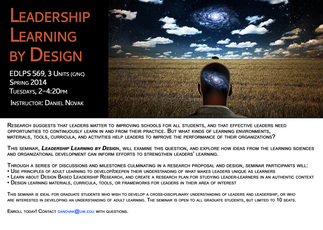EDLPS 569 - Leadership Learning by Design
Tuesday, 2-4:20pm, Miller 423A
3 Units, C/Nc, #13278A

Research suggests that leaders matter to improving schools for all students, and that effective leaders need opportunities to continuously learn in and from their practice. But what kinds of environments, tools, and practices help leaders to improve the performance of their organizations?
This seminar, Leadership Learning by Design, will examine this question, and explore how ideas from the learning sciences and organizational development can inform efforts to strengthen leaders’ capacity for learning and innovating.
Through a series of discussions and work sessions culminating in a research proposal and design, seminar participants will:
Through a series of discussions and work sessions culminating in a research proposal and design, seminar participants will:
- Use principles of adult learning to develop/deepen their understanding of what makes leaders unique as learners
- Learn how to apply the methods of Design Based Leadership Research to create a research plan for studying leader-learners in a real-world context
- Design learning materials, curricula, tools, or frameworks for leaders to use in their organizations
Highlights from the Syllabus
 The Anchored Instruction Cycle
The Anchored Instruction Cycle
In Leadership Learning by Design, participants build their research and design agendas over 10 weeks. In-class time is organized around a series of topics that will serve to deepen participants' understanding of how features of adult learning can support leaders' learning in their organizations. Project work time and guest lectures are built into each class.
Each week, participants will proceed through a process of inquiry around the week's topic, with central questions that connect the perspectives from the readings, guest talks, and brief lectures to their project and research interests. Participants will also complete weekly short assignments that build into a final Design-based Leadership Research proposal. Ideally, these projects will be useful in participants' future work.
Each week, participants will proceed through a process of inquiry around the week's topic, with central questions that connect the perspectives from the readings, guest talks, and brief lectures to their project and research interests. Participants will also complete weekly short assignments that build into a final Design-based Leadership Research proposal. Ideally, these projects will be useful in participants' future work.
|
Sample Schedule
Part 1: Frameworks for Understanding Adult Learning
Part 2: Designing for How Leaders Learn
Part 3: Making
|
Sample DBLR Project Components
Each of these short documents contributes to the participants' final reports and presentations. In the spirit of Human-Centered Design Engineering, this structure works backwards from real world needs for a new kind of leadership learning to the development of empirical research questions that can be tested through the design.
|
Selected Readings
- Clark, R. (2010) Developing Expertise
- Clark, R., and Mayer, R. (2013) eLearning and the Science of Instruction
- Gardner, H. (2011) Leading Minds: An Anatomy of Leadership
- Hermes, M., Bang, M., & Marin, A. (2012). Designing Indigenous Language Revitalization
- Lave, J. and Wenger, E. (1991) Legitimate Peripheral Participation: Communities of Practice
- Merril, M.D. (2002). First Principles of Instruction
- Mumford, M., Friedrich, T., Caughron, J., Antes, A. (2007) Leadership Development and Assessment: Describing and Rethinking the State of the Art
- Penuel, W., Fishman, B., Chang, B., and Sabelli, N. (2011) Organizing Research and Development at the Intersection of Learning, Implementation, and Design
- Sandoval, W. & Bell, P. (2004) Design-Based Research Methods for Studying Learning in Context
- Vygotsky, L. (1974) Mind in Society
- Wenger, E. (1997) Communities of Practice